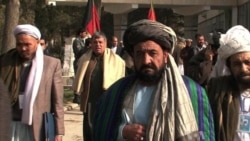KABUL —
When it comes to difficult national policy issues, political decision making in Afghanistan is a complex mix of parliamentary democracy and tribal consultations. Current Loya Jirga, or gathering of national elders, is being held to advise the government on the terms of a bilateral security agreement with Washington.
They no longer meet in a tent. But in Afghanistan, the gathering of tribal elders to consult on major decisions is a tradition with deep historical roots.
“In Europe and the United States, reaching out to the public for their opinion is called a referendum. In Afghanistan we have a tribal system, so we use the Loya Jirga as a form of referendum, this is our tradition," said lawmaker Kamal Nasir Usuli.
President Hamid Karzai called the Loya Jirga to gather a national consensus on a bilateral security agreement with the United States. The deal could see U.S. troops in Afghanistan for another 10 years, or longer.
Split into some 50 committees, these tribal elders, legal experts, religious scholars, women and elected leaders are debating the points of the agreement.
Some analysts say the aim of this Jirga is to give Karzai political cover for a decision that could open him up to charges that he is allowing foreign infidel troops to remain, says analyst Kate Clark.
“It’s drama, it’s political drama. It’s a way of spreading the responsibility for a difficult, politically sensitive decision. But it’s nothing else," said Clark.
One of the more contentious points is whether to allow U.S. forces and personnel who remain in Afghanistan the right to be tried in the United States rather than in Afghan courts.
While its opinion holds a lot of weight, it is Afghanistan’s nationally elected parliament that holds the final vote on the security pact.
“For the country, the decisions made by [an elected] parliament are more important than those of a Jirga, where participants from the provinces are selected to take part," said Abdul Ali Sultani, resident of the Farah province.
The Jirga is taking place under heavy security measures in Kabul after militants threatened to attack the meeting. The 2,500 members are to give their final opinion on the multi-page security document to Karzai on Sunday.
They no longer meet in a tent. But in Afghanistan, the gathering of tribal elders to consult on major decisions is a tradition with deep historical roots.
“In Europe and the United States, reaching out to the public for their opinion is called a referendum. In Afghanistan we have a tribal system, so we use the Loya Jirga as a form of referendum, this is our tradition," said lawmaker Kamal Nasir Usuli.
President Hamid Karzai called the Loya Jirga to gather a national consensus on a bilateral security agreement with the United States. The deal could see U.S. troops in Afghanistan for another 10 years, or longer.
Split into some 50 committees, these tribal elders, legal experts, religious scholars, women and elected leaders are debating the points of the agreement.
Some analysts say the aim of this Jirga is to give Karzai political cover for a decision that could open him up to charges that he is allowing foreign infidel troops to remain, says analyst Kate Clark.
“It’s drama, it’s political drama. It’s a way of spreading the responsibility for a difficult, politically sensitive decision. But it’s nothing else," said Clark.
One of the more contentious points is whether to allow U.S. forces and personnel who remain in Afghanistan the right to be tried in the United States rather than in Afghan courts.
While its opinion holds a lot of weight, it is Afghanistan’s nationally elected parliament that holds the final vote on the security pact.
“For the country, the decisions made by [an elected] parliament are more important than those of a Jirga, where participants from the provinces are selected to take part," said Abdul Ali Sultani, resident of the Farah province.
The Jirga is taking place under heavy security measures in Kabul after militants threatened to attack the meeting. The 2,500 members are to give their final opinion on the multi-page security document to Karzai on Sunday.






